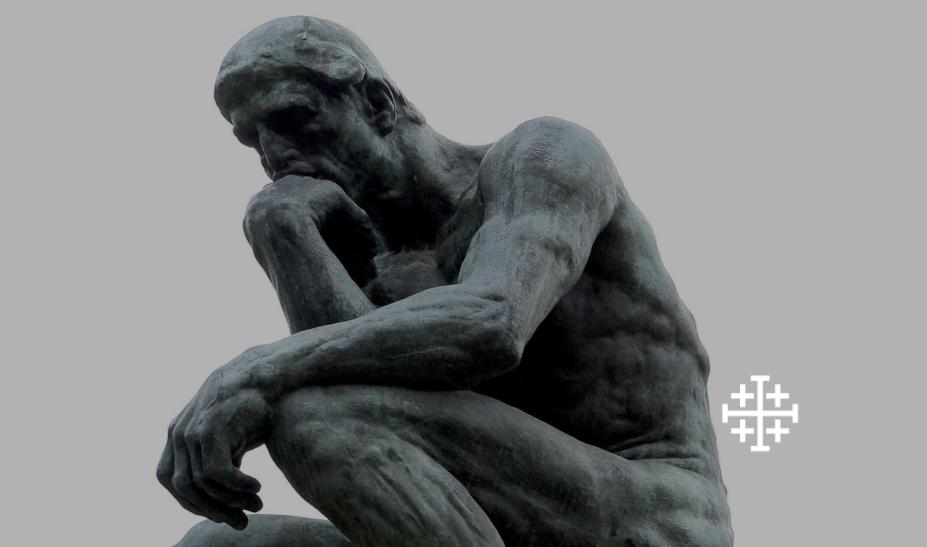The opposite of faith is not doubt, but unbelief. The mental unrest of doubt is natural to faith. Trials of doubt can be a kind of suffering that can purify and intensify our faith. Like a shadow reveals the presence of a body and a light, doubt is the negative space cast by faith in the brilliance of Truth. Doubt presumes faith. However, God always takes a risk in bringing us these trials of faith. Doubt can carry a hefty momentum that threatens to hurl us into unbelief, in which the labor pains of suffering give birth to a stillborn: denial.
Therefore, it is best to confront our doubts. We shouldn’t try to “solve them”, but we should “suffer them”, (i.e. engage them) and, thereby, allow our trial of faith to give birth to a new life. Here is one humble suggestion about how to do that.
- Doubt your doubts. It is an act of humility to not be cataclysmic in times of doubt and assume that because you are doubting something, “Oh no! That’s it! It must not be true!” In moments of skepticism, be skeptical of your skepticism. Doubt your doubts.
- But, if ignoring our doubts is all we should do, our spirit would break. No, the real profitable work in moments of doubt comes when we start to realize that what underlies our doubts are other beliefs. “‘The doubting of any explicit statement denies [one] belief… in favor of other beliefs which are not doubted for the time being.’ You can’t doubt belief A except on the basis of some belief B you are believing instead at the moment. So, for example, you cannot say, ‘No one can know enough to be certain about God and religion,’ without assuming at that moment that you know enough about the nature of religious knowledge to be certain about that.” (Tim Keller). Every doubt is based upon faith in something else.
- Therefore, we have to examine, “What am I actually believing right now that is making this doubt so easy?” When we start to examine the bases of these faiths (that are causing our doubts), they often are baseless, or at the very least, an enormous leap of faith! Then, ironically, we come to find out it takes much more faith to doubt what I had previously believed in than to just believe that thing.
For example, maybe we start to doubt God because we witness or endure some horrible suffering which happens for no good reason. Say that this doubt begins to shake us to the bone and we are ready to say there is no way a good, all-powerful God can exist. Then, it would do us well to realize that this doubt stems from a radical belief in the power of our own intelligence. This doubt stems from a belief that if we human beings can’t discern a sufficient reason for an act of God, then there can’t be any. But this assumes that if there was an infinite God, a finite mind should be able to evaluate his plans and motives. How reasonable is it to believe that? How reasonable is it to place that much faith in the powers of one’s own insight?
The princely power of Christianity is that once we unveil these beliefs that undergird our doubts, we find that it takes a much bigger leap of faith to doubt Christian claims than to believe in them.
This is why it is so important to keep reading Scripture and keep hearing the Gospel (in one way or another). Faith is always belief in some kind of truth-claim. Therefore, genuine doubt that would move us away from the Lord arises when we begin to believe a counterfeit truth-claim (i.e. a lie). So, in a sense, it’s not a lack of faith. It’s a wrestle between faiths.
So, we must confront our doubts. Even if it takes years, we must uncover the lie that is seducing our heart and mind. Putting one’s faith in a lie, in an un-truth, is foolish and destructive. Only the Truth sets us free. Doubt is a via dolorosa through which our faith can sink deeper and deeper into reality and freedom.
Joey McCoy
Latest posts by Joey McCoy (see all)
- Being A Catholic, Being Like Mary - September 21, 2017
- The Gospel and Growth in Virtue - July 20, 2017
- Progress in Virtue - July 18, 2017


Pingback: 12 Things An Adult Will Face If He Or She Has Been A Victim Of Child Abuse